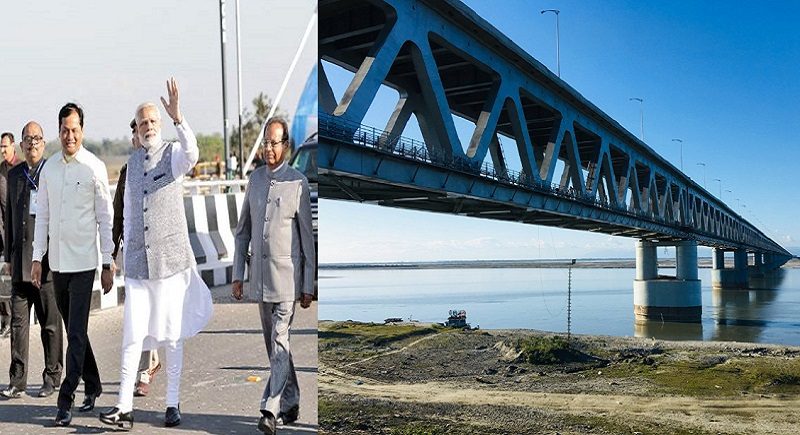PM Modi inaugurates strategically crucial India’s longest rail cum road Bogibeel bridge
Prime Minister Narendra Modi inaugurated the longest bridge measuring 4.9 km long in Assam today, letting it open to traffic. The Bogibeel Bridge marking India’s first longest rail cum road bridge, it is Asia’s second longest built over the Bramhaputra river in the eastern parts of Assam. The bridge will likely be named as ‘Atal Setu’ coinciding with the birth anniversary of the former PM to India Atal Bihari Vajpayee.
PM Modi landed at Dibrugarh in Assam at 1:30pm and directly headed to the Bogibeel Bridge for inauguration. After inauguration, PM Modi took a 5km ride on the road bridge to the other side, Dhemaji and flag off the New Tinsukia-Naharlagun intercity express linking Naharlagun in Aruanchal pradesh to Tinsukia in Assam.
The country’s only fully welded bridge, constructed at an estimated cost of Rs 6000 crore has a serviceable period of around 120 years. The bridge reduces the travel time and distance from Assam to Arunachal Pradesh to 4 hours and 170 kms respectively. It will also reduce Delhi to Dibrugarh train-travel time by about three hours to 34 hours as against 37 hours presently.
Delighted with the completion of the bridge during his tenure, Assam Chief Minister Sarbananda Sonowal said, “This bridge is a dream come true. It will not only connect Dhemaji and Dibrugarh districts, the north and south banks of Brahmaputra River, but will also play a major role in the economic growth of the region, strengthen security and boost connectivity for the people of neighbouring Arunachal Pradesh.”
The bridge is part of infrastructure projects planned by India to improve logistics along the border in Arunachal Pradesh. This includes the construction of a trans-Arunachal highway on the north bank of the Brahmaputra, and new road and rail links over the Bramhaputra and its major tributaries such as the Dibang, Lohit, Subansiri and Kameng.

The bridge has a two-line railway track on the lower deck and a three-lane road on the top deck. For the first time in Indian Railways, the girder has steel floor system for railway tracks and concrete for road. “Early flood in the river Brahmaputra restricted the working season to a very short period of approximately five months (from November to March) and demanded huge mobilization of construction equipment,” said the Chief Engineer Mohinder Singh. “Transportation of concrete across river channels of 600 metre to 900 metre width from both the north and south banks was the biggest challenge”, he added.
“This bridge is part of infrastructure projects to improve logistics along the border in Arunachal Pradesh. This includes the construction of a trans-Arunachal highway on the north bank of the Brahmaputra, and new road and rail links,” a defence official said.
Speaking about the bridge, former Assam chief minister Prafulla Kumar Mahanta, said: “It has been a long-pending demand of the people of the region and I feel glad that it has become a reality now.”
“The 4.9km-long bridge, which witnessed several protests and missed deadlines, will not only improve connectivity between the banks of the mighty Brahmaputra River, but also help the economic development of the region and strengthen the defence movement along the India-China frontiers.”, he added.
The Bogibeel Bridge, an offshoot of the Assam Movement which culminated with the signing of the Assam Accord in 1985, is also recognised as Asia’s second-longest bridge with three-lane roads on top and a double line rail below.
Sanctioned on January 22, 1997, the then Prime Minister HD Deve Gowda had laid the foundation stone for the bridge. However, the construction began only after former PM Atal Bihari Vajpayee inaugurated the work site on April 21, 2002. The inauguration ceremony of the bridge coincides with the 94th birth anniversary of Vajpayee, who passed away in August this year.
“The railway budget had no mention of the bridge initially. But we vehemently demanded it in the cabinet meeting ahead of placing the railway budget. Only then did the railway ministry agreed to our demands.”, said Birendra Prasad Baishya, Lok Sabha MP from Asom Gana Parishad.
Subsequently, the Bogibeel Bridge was granted a national project status in 2007. Expected to be completed by 2009, several deadlines were missed leading to a massive cost escalation of the project from approximately Rs 1,700 crore to almost Rs 5,000 crore.




